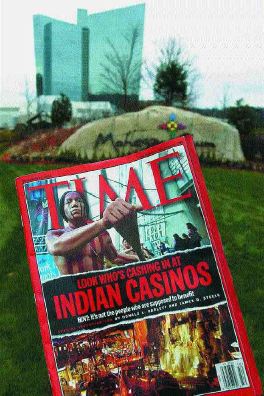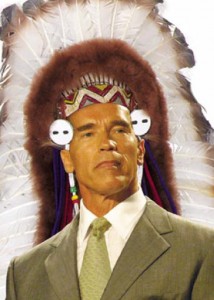Indian Gaming, like reservations, is a complex subject. I address it now because of the coming premiere at the Sundance Film Festival of Casino Jack and the United States of Money, Oscar winner Alex Gibney’s documentary on Jack Abramoff and his lobbyistg scamming of everyone, including, as always, his own clients – various Indian Tribes that hired him to represent their casino interests. Indian Country Today offers a more Native perspective.
Casino gambling offers ready opportunity for moralizing, and historically, in addition to killing, conquering, lying to, and stealing from Indians, there is nothing non-Native America has better liked to do than lecture and moralize to them. Pointing out that American Indians engaged in warfare too, and that, now, they are willing to make a buck off one of the time-honored vices of non-Native America, just serves, somehow, to justify it all, certainly wash it away. Apparently, money in the pockets of Indians need be purer than the ethically enriched revenues of the typical non-Native business enterprise. And if the dollars are accumulating too bountifully (which seems to mean noticeably), then the earth will be thrown off its axis. This seemed to be the case when the mysteriously well-regarded Arnold Schwarzenegger first ran for California governor in the recall election against Grey Davis in 2003. (Bang up job he’s done in California, don’t you think, “opening up the books, letting the light shine in,” as he put it at the time? No doubt Davis is choking on the pudding that contains the proof of Schwarzenegger’s political and executive superiority.)
the ethically enriched revenues of the typical non-Native business enterprise. And if the dollars are accumulating too bountifully (which seems to mean noticeably), then the earth will be thrown off its axis. This seemed to be the case when the mysteriously well-regarded Arnold Schwarzenegger first ran for California governor in the recall election against Grey Davis in 2003. (Bang up job he’s done in California, don’t you think, “opening up the books, letting the light shine in,” as he put it at the time? No doubt Davis is choking on the pudding that contains the proof of Schwarzenegger’s political and executive superiority.)
In fact, what was little noted, because so few cared, was that Schwarzenegger ran (please note that I do not use this word often and casually) a pointedly racist campaign against the Indian Tribes of California in 2003. Seeking to stoke further the discontent of Californians with the Davis status quo, the governator decided to run a series of ads aimed at resentment of the accumulated casino wealth of some California tribes.
Their casinos make billions, yet they pay no taxes and virtually nothing to the state. Other states require revenue from Indian gaming, but not us. It’s time for them to pay their fair share. All the other major candidates take their money and pander to them. I don’t play that game. Give me your vote and I guarantee you things will change.
That was the problem with the California economy – the damned Indians (they never cease to be a thorn) were making too much money. They didn’t contribute enough. (The continent, one deduces, was insufficient.) We’re sick and tired of bowing down to them.
The level of historical ignorance was striking, but no more than the electorate would tolerate. The Schwarzenegger advisers bet that there is never any downside to stoking ill will toward Indians, and the results did not prove them wrong.
If a person is inclined to pay attention, there will be news stories about ugly battles, within some tribes, over the divvying up of Casino profits. Some Tribes treat the profits as a kind of annuity, with a yearly dividend to enrolled tribal members. This has led to unseemly battles over qualifications for official enrolled status in a tribe, with disputes about the degree of blood quantum sufficient for that status. Tribal members emerge from obscurity seeking their share. It is all so very atypical of human behavior generally. Add to it all examples of people spending their money on alcohol and drugs, and generally wastefully, and y0u get a story bearing no relation to what has occurred each year since 1982 with the distribution of the Alaska Permanent Fund dividend from oil profits to state residents. During those cold dark winter months, they’re all going to community college courses to retrain and improve themselves.
battles over qualifications for official enrolled status in a tribe, with disputes about the degree of blood quantum sufficient for that status. Tribal members emerge from obscurity seeking their share. It is all so very atypical of human behavior generally. Add to it all examples of people spending their money on alcohol and drugs, and generally wastefully, and y0u get a story bearing no relation to what has occurred each year since 1982 with the distribution of the Alaska Permanent Fund dividend from oil profits to state residents. During those cold dark winter months, they’re all going to community college courses to retrain and improve themselves.
If one is not sufficiently knowledgeable, one will not know that it hasn’t worked out quite that well for all Casinos and their Tribes. And if a Tribe was really unlucky, it hired Jack Abramoff to try to make its members some money. But that angle is a story for another day. A better contrasting story is of those tribes that have chosen not to payout an individual dividend, but instead to use Casino profits to fund government operations and development initiatives. This is true, for instance, of many of the Oklahoma Tribes, some of which over the past 10-15 years have made enormous strides in social, educational, and cultural redevelopment. In part, among such Tribes as the Choctaw, the Cherokee, and the Chickasaw, this has been the benefit of uniquely talented leaders coming along at the right time. But those leaders could have accomplished little without the resource of the Casino profits.
The Choctaw, for instance, under the leadership since 1997 of Chief Gregory Pyle have become an exemplar of the kinds of successes a well-governed and adequately-funded Indian nation can enjoy. Aided by federal programs to boost contracts for small, disadvantaged and HUBzone businesses, profits from the casino business have helped establish the Choctaw Manufacturing and Development Corporation and Choctaw Management Services Enterprises. The latter was “created to provide healthcare staff, information technology support, and administrative management for government and commercial clients,” including U.S. military bases and embassies. In Talihina, Oklahoma the Choctaw constructed the first Indian hospital – with satellites throughout the Choctaw non-reservation geographical area – fully funded by its tribe, without funds from the Indian Health Service.
The following is A Policy Primer on American Indian Governments and Their Gaming Operations, from the Harvard Project on American Indian Economic Development. (Large PDF)
The gaming enterprises of American Indian tribes are operations of American Indian tribal governments. With powers akin to one of the states, these governments are recognized by the U.S. Government pursuant to the U.S. Constitution, centuries-old treaties, numerous Supreme Court decisions, Presidential orders, and acts of Congress. Today, in the lower 48 states, .Indian Country. is comprised of 350 Indian areas that are associated with federally-recognized tribes and tracked by the U.S. Census. These consist of 310 reservations and 40 Indian statistical areas, 29 of which are in Oklahoma.1 The reservations range in size from a few acres to hundreds of thousands of acres: the Navajo Nation.s reservation is approximately the size of West Virginia.
Just as states in the United States have certain powers of jurisdiction within their boundaries, so tribes have governmental powers within their boundaries. While tribes (and states) cannot exercise powers such as raising an army or issuing currency, they possess powers to: determine their respective forms of government (e.g., craft constitutions), define citizenship, pass and enforce laws through their own police forces and courts, collect taxes, regulate the domestic affairs of their citizens, and regulate property use (e.g., through zoning, permitting, environmental regulation, and the like). And like states, American Indian governments have the power to determine whether they will engage in gaming operations.
American Indian governments. rights to gaming have their roots in the U.S. Constitution. The Commerce Clause of the Constitution provides that: .The Congress shall have Power. o regulate Commerce with foreign Nations, and among the several States, and with the Indian Tribes.. Accordingly, when the State of California tried to block the government of the Cabazon Band of Mission Indians from operating a gaming enterprise in the mid-1980s, the U.S. Supreme Court upheld Cabazon.s rights to determine for itself if and how it would operate gaming enterprises. The Court recognized California and Cabazon as separate sovereigns . just as California and, say, Nevada (which, like Cabazon, shares its border with California) are recognized as separate sovereigns when it comes to Nevada.s right to allow gaming.
With tribes rights of gaming thus affirmed, Congress passed the Indian Gaming Regulatory Act of 1988 (IGRA). This Act circumscribes the rights recognized by the Supreme Court in Cabazon. Under IGRA, all gambling activities on the reservations are subject to each tribe.s own gaming laws, ordinances, and commissions. Class II gambling (e.g., bingo and related games) and Class III gambling (including, e.g., slot machines and casino games) are both subject to the oversight of the federal National Indian Gaming Commission. And Class III gambling may be subject to state regulation and oversight depending on how these are specified and negotiated in intergovernmental tribal-state compacts.
Paralleling the decisions of many states to operate state lottery businesses in order to help fund state governmental activities, approximately 200 tribal governments are currently engaged in Class II (e.g., bingo) or Class III (e.g., full-scale casinos) gaming. As required by IGRA, revenues from tribal governmental gaming must be directed towards: funding tribal government operations and programs; providing for the general welfare of tribal citizens; promoting economic development; supporting charitable organizations; and funding operations for local, non-tribal government agencies.
Mirroring the decisions of state governments to create and join various associations of state lotteries, 147 tribal governments currently constitute the voting membership of the National Indian Gaming Association (NIGA). Both the Indian and state gaming associations are created pursuant to the respective governments. obligations to serve their citizens. interests, and both types of associations fund research into the impacts of their governmental gaming programs
AJA
This entry was posted on Thursday, January 28th, 2010 at 8:30 am by A. Jay Adler and is filed under Indian Country. | Edit
2 Responses to “Indian Country Betting on the Future”
-
the sad red earth » Indian Country Betting on the Future | Indian Today, on January 28th, 2010 at 12:08 pm Said: Edit Comment
[…] is the original post: the sad red earth » Indian Country Betting on the Future Share and […]
-
Yuras Karpau, on January 29th, 2010 at 7:38 am Said: Edit Comment
Indian gambling business – fun, entertainment, which is comparable to alcohol and drugs. We have another representation of the dignity of the Indian: http://www.whoisleonardpeltier.info/ .















Indian gambling business – fun, entertainment, which is comparable to alcohol and drugs. We have another representation of the dignity of the Indian: http://www.whoisleonardpeltier.info/ .